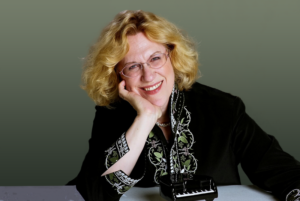THE BASICS: Sara Davis Buechner plays Saint-Saens’ (say “san-saws”) Piano Concerto No. 2 in the first half while Mahler’s Symphony Number 4 fills the second half of the program at Kleinhans Music Hall. Concert repeats this Sunday, October 10, at 2:30. Kleinhans Music Hall is located at “3 Symphony Circle” Buffalo, 14201 where Porter Avenue, Richmond Avenue, North Street and Wadsworth meet at a traffic circle. Visit www.bpo.org or call 716-885-5000. Ask about special season ticket deals for students.
Runtime: 2 hours with one 15-minute intermission
As pianist David Buechner, this weekend’s featured soloist was a bronze medalist at the Tchaikovsky Competition (the Mount Everest of piano competitions) and performed far and wide. Then, after transitioning to Sara Davis Buechner, booking agents wouldn’t take her calls. That’s all well-documented in many interviews and speaking engagements with Ms. Buechner, who describes herself as “a proud transgender woman.”
In these more enlightened times of embracing LGBTQ artists, it’s still a hard truth that, to quote a 2013 NPR piece, “progress on LGBT issues, at least in the American classical music community, still stops at the LGB part of that equation….”
Get ready to be blown away.
So while she’s been in Buffalo before (most recently performing Beethoven’s 3rd piano concerto in 2018) and also at Chautauqua, if you’ve never seen her play the piano (or heard her on our local station WNED Classical) then get ready to be blown away. What do I mean by that? The 19th century composer Camille Saint-Saens is best known for his “Carnival of the Animals,” a work featuring two pianos, and you’ll swear if you go to the encore presentation of the concert this afternoon that you’re hearing those two pianos. No, just one, but what a pianist. Delicate filigrees here, pounding chords there.
When the dynamic French Canadian pianist Alain Lefèvre visited Buffalo on two separate occasions, the piano began to move, literally, down-stage. Technicians have since figured out how to prevent that, and that’s a good thing, because I thought, if that’s ever going to happen again, it’s now. And talking about “move” or, as classical musicians would say it “con moto,” my last review noted that conductor Falletta took Beethoven’s 5th at the new standard ultra-fast tempo. Well, as fast as Falletta conducts, Buechner was giving the orchestra a run for its money!
One last word on the Saint-Saens. If you’re not familiar with his five piano concertos, but you do know Chopin and Rachmaninoff, then think maybe of Chopin in the right hand and Rachmaninoff in the left. Or think of the words to the Tennessee Ernie Ford song “Sixteen Tons” – “I’ve got one fist of iron, the other of steel, if the right don’t getcha, then the left one will.”
After 18 months, the world has slowly been waking up, and the BPO is back at Kleinhans.
So after 18 months, the world has slowly been waking up, and the BPO is back at Kleinhans (by the way, you need your Vax card and you have to wear your mask for the entire performance) but what I had missed is the spontaneous leap to the feet audience reaction. Well, now I can check that off my “to do” list for 2021. Following the Saint-Saens, the encore, perhaps in honor of Hispanic Heritage Month (see more on that below), was a piece called “Catalana” by Spanish composer Federico Longas.
JoAnn Falletta is particularly adept at any early 20th century music.
JoAnn Falletta, a student of Leonard Bernstein, who is credited with starting the modern audience love of composer Gustav Mahler, has always been deeply involved in his music. She’s particularly adept at any early 20th century music, whether it’s Maurice Ravel or Richard Strauss, Marcel Tyberg or Florent Schmitt, but her love of Mahler is deep and, once again, it showed. How deep? Usually she conducts entire hour-long Mahler symphonies from memory, without a score, so I was a little surprised to see the score on her podium, until I remembered that, in the fourth and final movement, there is a soprano soloist. She once told me that her self-imposed rule is, if there’s a soloist, she always has the score in front of her, “just in case.”
The soloist, guest artist soprano Maeve Hoglund, blended perfectly with the orchestra, singing the child’s vision of heaven. Her voice is round and soft and in fact she has sung the role of “Gretel” in the Humperdinck opera “Hansel und Gretel” so she was an inspired choice.
Kleinhans Music Hall has legendary acoustics. Pianist Van Cliburn told me it’s because of all the wood. Well, whatever the reason, Falletta used that to the utmost because Mahler loved to use all the different instruments of the orchestra in exciting combinations. When you attend this afternoon, there is no sound system in the world that can deliver that intimate and at the same time infinite sound-scape.
UP NEXT: A free classical concert called Celebración de la Guitarra featuring Hispanic composers and performers and lots of guitar music, Tuesday October 12, at 7:00 p.m. (Yes it’s free, but bring your proof of vaccination and wear a mask). Then, wrapping up Hispanic Heritage Month, it’s a BPO Pops concert “Tango Caliente” on October 16 and the next BPO Classics concert features the BPO concertmaster, violinist Nikki Chooi, playing Brahms on a Saturday-Sunday series, October 23-24.

